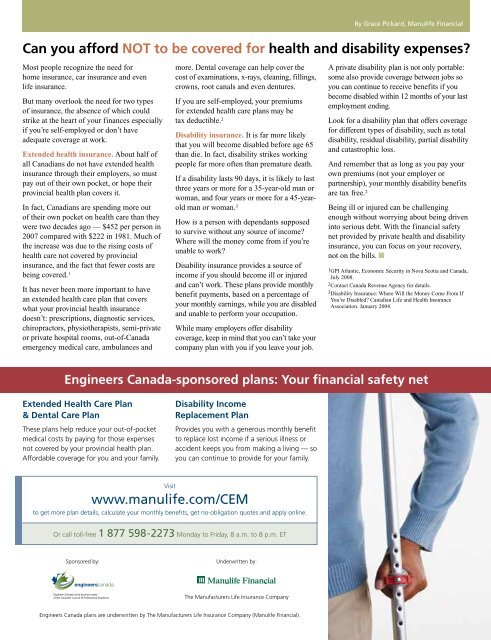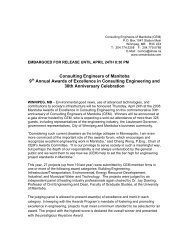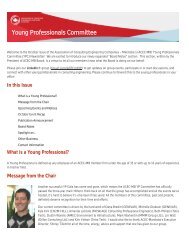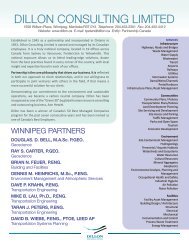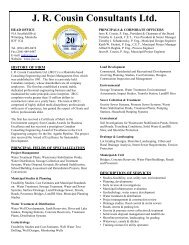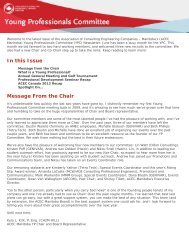Premiere Edition - ACEC|Manitoba
Premiere Edition - ACEC|Manitoba
Premiere Edition - ACEC|Manitoba
Create successful ePaper yourself
Turn your PDF publications into a flip-book with our unique Google optimized e-Paper software.
By Grace Pickard, Manulife Financial<br />
Can you afford NOT to be covered for health and disability expenses?<br />
Most people recognize the need for<br />
home insurance, car insurance and even<br />
life insurance.<br />
But many overlook the need for two types<br />
of insurance, the absence of which could<br />
strike at the heart of your finances especially<br />
if you’re self-employed or don’t have<br />
adequate coverage at work.<br />
Extended health insurance. About half of<br />
all Canadians do not have extended health<br />
insurance through their employers, so must<br />
pay out of their own pocket, or hope their<br />
provincial health plan covers it.<br />
In fact, Canadians are spending more out<br />
of their own pocket on health care than they<br />
were two decades ago — $452 per person in<br />
2007 compared with $222 in 1981. Much of<br />
the increase was due to the rising costs of<br />
health care not covered by provincial<br />
insurance, and the fact that fewer costs are<br />
being covered. 1<br />
It has never been more important to have<br />
an extended health care plan that covers<br />
what your provincial health insurance<br />
doesn’t: prescriptions, diagnostic services,<br />
chiropractors, physiotherapists, semi-private<br />
or private hospital rooms, out-of-Canada<br />
emergency medical care, ambulances and<br />
more. Dental coverage can help cover the<br />
cost of examinations, x-rays, cleaning, fillings,<br />
crowns, root canals and even dentures.<br />
If you are self-employed, your premiums<br />
for extended health care plans may be<br />
tax deductible. 2<br />
Disability insurance. It is far more likely<br />
that you will become disabled before age 65<br />
than die. In fact, disability strikes working<br />
people far more often than premature death.<br />
If a disability lasts 90 days, it is likely to last<br />
three years or more for a 35-year-old man or<br />
woman, and four years or more for a 45-yearold<br />
man or woman. 3<br />
How is a person with dependants supposed<br />
to survive without any source of income?<br />
Where will the money come from if you’re<br />
unable to work?<br />
Disability insurance provides a source of<br />
income if you should become ill or injured<br />
and can’t work. These plans provide monthly<br />
benefit payments, based on a percentage of<br />
your monthly earnings, while you are disabled<br />
and unable to perform your occupation.<br />
While many employers offer disability<br />
coverage, keep in mind that you can’t take your<br />
company plan with you if you leave your job.<br />
A private disability plan is not only portable:<br />
some also provide coverage between jobs so<br />
you can continue to receive benefits if you<br />
become disabled within 12 months of your last<br />
employment ending.<br />
Look for a disability plan that offers coverage<br />
for different types of disability, such as total<br />
disability, residual disability, partial disability<br />
and catastrophic loss.<br />
And remember that as long as you pay your<br />
own premiums (not your employer or<br />
partnership), your monthly disability benefits<br />
are tax free. 2<br />
Being ill or injured can be challenging<br />
enough without worrying about being driven<br />
into serious debt. With the financial safety<br />
net provided by private health and disability<br />
insurance, you can focus on your recovery,<br />
not on the bills. ■<br />
1 GPI Atlantic, Economic Security in Nova Scotia and Canada,<br />
July 2008.<br />
2 Contact Canada Revenue Agency for details.<br />
3 Disability Insurance: Where Will the Money Come From If<br />
You’re Disabled? Canadian Life and Health Insurance<br />
Association. January 2004.<br />
Engineers Canada-sponsored plans: Your financial safety net<br />
Extended Health Care Plan<br />
& Dental Care Plan<br />
These plans help reduce your out-of-pocket<br />
medical costs by paying for those expenses<br />
not covered by your provincial health plan.<br />
Affordable coverage for you and your family.<br />
Disability Income<br />
Replacement Plan<br />
Provides you with a generous monthly benefit<br />
to replace lost income if a serious illness or<br />
accident keeps you from making a living — so<br />
you can continue to provide for your family.<br />
Visit<br />
www.manulife.com/CEM<br />
to get more plan details, calculate your monthly benefits, get no-obligation quotes and apply online.<br />
Or call toll-free 1 877 598-2273 Monday to Friday, 8 a.m. to 8 p.m. ET<br />
Sponsored by:<br />
Underwritten by:<br />
The Manufacturers Life Insurance Company<br />
Engineers Canada plans are underwritten by The Manufacturers Life Insurance Company (Manulife Financial).


